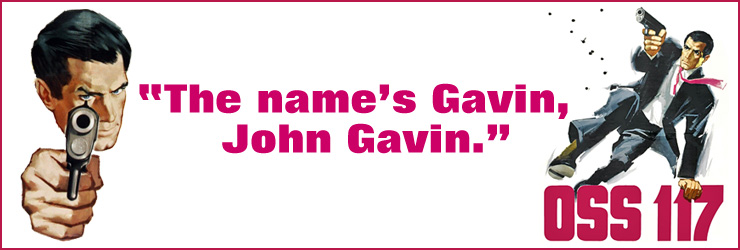 |
|
Also in 1967, John Gavin
appeared in the big-budget 1920s-era musical Thoroughly Modern Millie
starring Julie Andrews and directed by George Roy Hill. Gavin’s next
film was the French/Italian 007 spoof OSS 117 – Double Agent (1968)
in which he was cast in the title role. Gavin replaced Frederick Stafford,
who had played the part in the two previous OSS 117 films, and who had
just signed to star in Alfred Hitchcock’s Topaz. OSS 117 is the
codename for Hubert Bonisseur de La Bath, a fictional secret agent created
by the prolific French author Jean Bruce. The first novel in the series
Tu parles d'une ingénue (Ici OSS 117) appeared in 1949, predating Ian
Fleming’s CASINO ROYALE by four years. Several of Bruce’s OSS 117 novels
have been turned into films, although Atout coeur à Tokyo pour OSS 117
(Terror in Tokyo) released in 1966 and starring Frederick Stafford as
OSS 117, had an original screenplay by three-time James Bond director
Terence Young. |
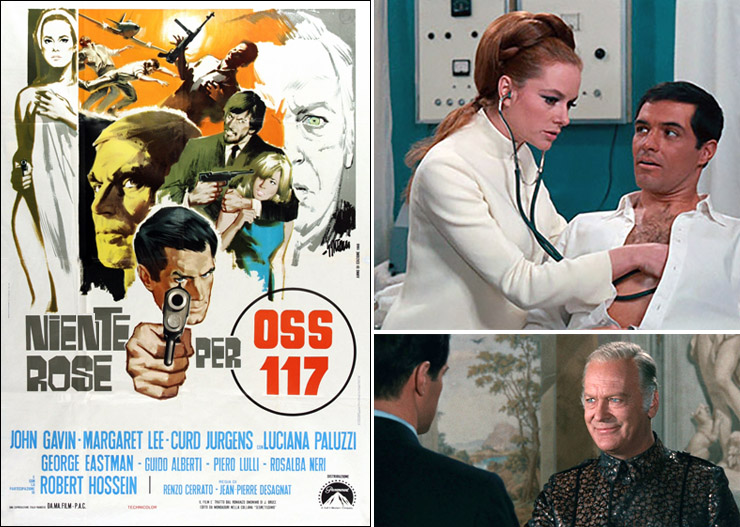 |
|
ABOVE: A ROSE BY ANY
OTHER NAME... The original 1968 Italian poster for Niente Rose
Per OSS 117, which translates as ‘No Roses For OSS 117’. John
Gavin co-starred alongside former Bond bad-girl Luciana Paluzzi
[Fiona Volpe in Thunderball (1965)] and future James Bond
villain Curt Jurgens [Stromberg in The Spy Who Loved Me
(1977)]. |
|
|
|
In OSS 117 - Double
Agent John Gavin starred opposite future James Bond villain
Curt Jurgens [Stromberg in
The Spy Who Loved Me (1977)], and former Bond
bad-girl Luciana Paluzzi [Fiona Volpe in
Thunderball (1965)]. Released in Europe in 1968 at
the tail-end of the spy boom spawned by the success of the James Bond
films, Gavin’s interpretation of OSS 117 was never shown theatrically in
the United States, but was broadcast on television in 1972 as Murder For Sale.
The film screened in the UK in 1970 under the title OSS 117 Murder For
Sale, as the lower half of a double-bill with the comedy Doctor in
Trouble, the seventh and final instalment in the popular Doctor
series. The plot of OSS 117 - Double
Agent had the hero undergo plastic surgery to fool his enemies
(and explain why the character doesn’t look like Frederick Stafford who
played him in the previous two films), a far-fetched idea that was briefly
considered during the development of the script for On Her Majesty’s
Secret Service, but wisely rejected. Returning to the United States
Gavin then had supporting roles in The Madwoman of Chaillot (1969),
and Pussycat, Pussycat, I Love You (1970), a pseudo sequel to the
1965 comedy What’s New Pussycat? |
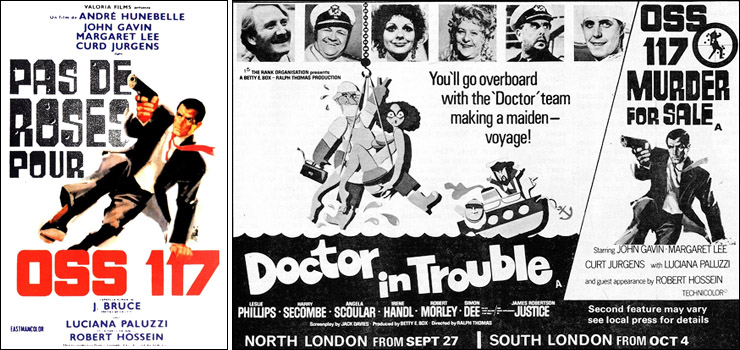 |
|
ABOVE: (left) The original 1968 French poster under the title
Pas De Roses Pour OSS 117 (right) Another title change when
OSS 117 Murder For Sale is released in the UK in 1970 as the
lower half of a double-bill with Doctor In Trouble. |
|
|
|
John Gavin was then
engaged to appear in a stage production of The Tunnel of Love at
the Pheasant Run Playhouse in Chicago, scheduled to run from February 9 –
March 7, 1971. John Gavin’s announcement as the new James Bond then
appeared in many US newspaper columns in late January and Early February
1971. The February 5th edition of the Chicago newspaper Elk Grove
Herald then announced that John Gavin would be replaced in The
Tunnel of Love by TV actor Dick Kallman (1933-1980). In another
curious James Bond connection, Dick Kallman was also a budding singer and
had recorded two albums at EMI in England in the early 1960s; on some
tracks the orchestra was conducted by
John Barry, with others conducted by
legendary composer Ennio Morricone, and popular arranger Geoff Love (who
would release his own 007 cover versions album Big Bond Movie Themes
in 1975). Richard Kallman retired from showbusiness and formed his own
music production company in 1966, later becoming a wealthy antiques and
art dealer. Richard Kallman and his partner Stephen Szladek were murdered
by three men during a robbery at the couple’s Manhattan apartment on
February 22, 1980. |
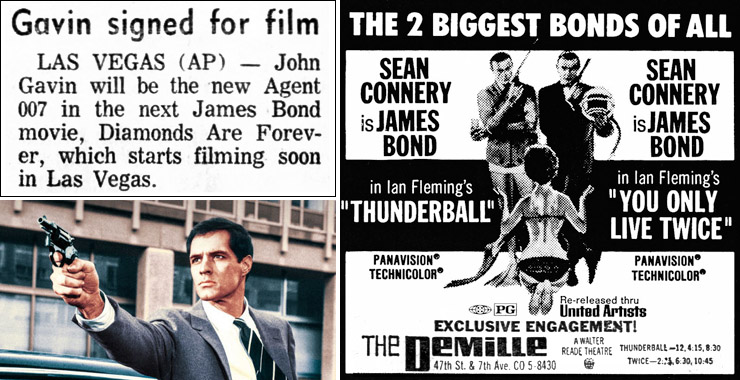 |
|
Although announced as
James Bond and all set to start shooting in March in Las Vegas,
Diamonds Are Forever distributor United Artists were still not
convinced Gavin was the right man for the job. Studio head David Picker,
who was involved with the casting of Sean Connery a decade earlier, was
sure that after the disappointing returns of On Her Majesty’s Secret
Service (1969), only one man could guarantee a box-office smash.
You Only Live Twice/Thunderball had just been re-released on a
double-bill in late 1970 and was the first time Sean Connery’s Bond films
had been seen in USA cinemas for over a year. The pair played to enormous
success well into 1971, re-enforcing in the public’s mind that Sean
Connery was still James Bond. |
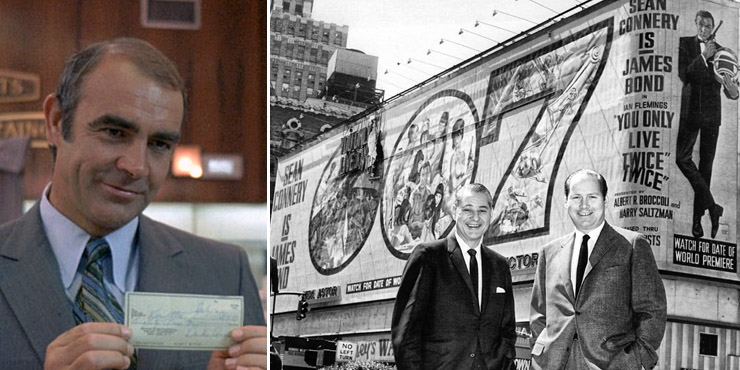 |
|
ABOVE: (left) FOR A
FEW DOLLARS MORE? Sean Connery in
The Anderson Tapes (1971)
the film made before his return to Bondage, and his first
substantial hit since turning his back on 007. (right)
United Artists
executive David Picker (right) with his uncle Arnold Picker in
front of the Astor cinema on New York's Times Square. The
block-long billboard was 260-feet wide by 60-feet tall and
dominated the Broadway skyline above the Astor and Victoria
Theatres months before the opening of You Only Live Twice
(1967). |
|
|
|
In February 1971
David
Picker informed the James Bond producers that he would authorise the
payment of a huge salary to sign Sean Connery. Associate producer on
Diamonds Are Forever
Stanley Sopel, and a personal friend of the star,
was despatched to meet him at the Dorchester Hotel in London. Since
leaving Bond in 1967, Connery’s career had faltered but he was still
determined to make it on his own and declined the offer to return, seeing
it as a step backwards and an admission of failure. Undaunted, Broccoli &
Saltzman next asked Ursula Andress, always Connery’s favourite Bond
leading lady, to personally persuade him to change his mind. When that
didn’t work, David Picker decided to tackle the star himself and flew to
London with an unprecedented offer; a staggering basic fee of $1.25
million and a 10% cut of the gross profits. Furthermore, Picker promised
Connery that United Artists would financially back, to the tune of one
million dollars apiece, any two films of his choosing; to either star in
or direct. One of those films turned out to be the gritty police drama
The Offence (1972), for which Connery gave one of his best
performances; the other project never materialised. |
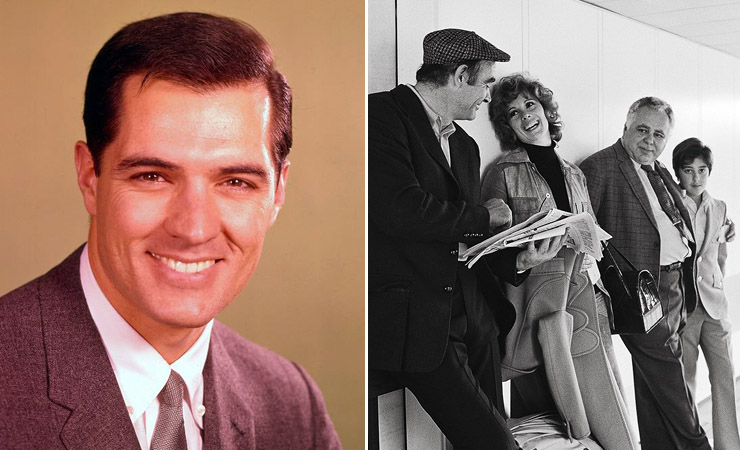 |
|
ABOVE: (Right) Sean Connery (James Bond), Jill St. John (Tiffany
Case) and James Bond co-producer Harry Saltzman with his son
Steven at the start of shooting on Diamonds Are Forever
(1971). |
|
|
|
To paraphrase Don
Corleone (played by Marlon Brando in The Godfather), Sean Connery
was literally made an offer he couldn’t refuse and his return as 007 was
obviously BIG news. On February 28, 1971 the Chicago Sun Times
columnist Irvin Kupcinet broke the story that John Gavin was out and
Connery was back as Bond. United Artists formally announced Connery’s
return on March 2, 1971. Luckily, John Gavin had made a pay-or-play deal
and it was reported in many columns the following week that he had
received $50,000 for tearing up his contract. For United Artists this was
a small price to pay. On March 13, 1971 the Atlanta Constitution
ran a story that not only confirmed Connery’s deal, but also had a dig at
George Lazenby and John Gavin. |
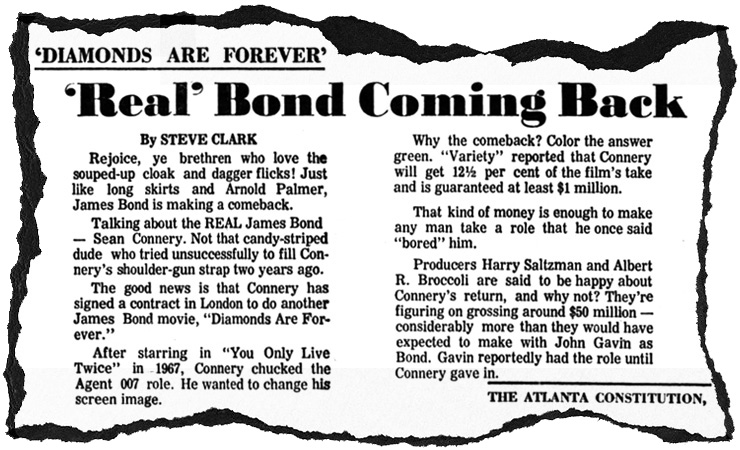 |
|
Similar stories filled
the US columns in the days that followed. However, the Salt Lake
Tribune announced that although John Gavin was to have the James Bond
role in Diamonds Are Forever until Sean Connery decided to play it
again, he may now play the villain in that film. The piece appeared in the
April 1st edition of the newspaper – make of that what you will!
The Derrick newspaper in Oil City, Pennsylvania followed up on
April 3rd with the news that “Hard on the heels of the announcement that
darkly handsome John Gavin (he starred briefly on TV in Convoy)
will be the next James Bond, comes word that things are coming full circle
and the next Bond after Gavin (a fine choice, by the way) will be Sean
Connery. Again! After all he said about fluff stuff. Connery, a good
serious actor, is finding there just aren’t that many good serious
opportunities.” |
|
CONTINUED |


